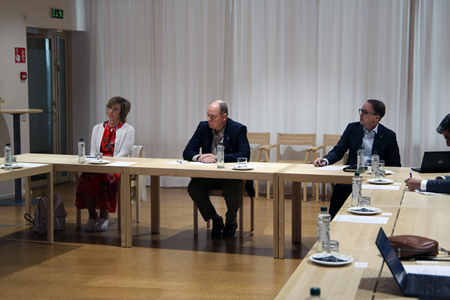HSH Prince Albert II of Monaco met with Rector Antti Syväjärvi, University of Lapland and Rector Sari Lindblom, University of Helsinki in Arktikum, Rovaniemi on June 6. Purpose of the visit was to discuss Arctic science collaboration and Arctic strategies from university perspectives and UArctic’s role as initiator of collaboration project. The Rovaniemi event was chaired by the President of UArctic Lars Kullerud.

The special features of both universities' Arctic research were presented by the rectors in the meeting. Research professor John Moore from the Arctic Centre brought the researcher’s point of view to the meeting from the side of the University of Lapland. After the visit in Rovaniemi, the program continued to the Värriö Subarctic Research Station of the University of Helsinki.
HSH Prince Albert II of Monaco is honorary doctorate of the University of Lapland since 2019.
HSH Prince Albert II of Monaco has promoted environmental protection and climate change research through the foundation he established in 2006. The Foundation exists to promote a new relationship with nature and the innovations that can impact this change. The Foundation works in three main geographical areas: the Mediterranean Basin, the Polar Regions and the Least developed countries.
UArctic has a MOU on collaboration with Prince Albert II Foundation since 2009, and the Foundation has over the years funded many UArctic projects. The latest is AASCO II, coordinated by the University of Helsinki and the UH- led UArctic Thematic Arctic Boreal Hub Thematic Network.
Statement by HSH Prince Albert II of Monaco on June 6, 2023 in Rovaniemi:
Dear professors and researchers from Lapland and Helsinki Universities, dear UArctic friends.
First and foremost, I would like to say how delighted I am to be back here in Rovaniemi, among you, a little more than four years after you did me the honor of awarding me an honorary doctorate from the University of Lapland. That was in May 2019, in the world before, in a Europe still at peace, and a Europe that had not yet seen the pandemic, so many things have changed since.
I would like to thank you for organizing this meeting and to tell you how important it is.
We need your expertise, your analysis, your research, without which nothing could be done to save our planet.
This is particularly true for regions as special as the Arctic – so important and yet still so poorly understood. And I should add that here, more than elsewhere, we need this analysis and research to be based on local studies, informed by the knowledge and practices of those living on these lands and who are familiar with their distinctive features.
That is why my Foundation has supported important projects implemented by U Arctic for several years, and which effectively fulfills these requirements.
That is also why Polar issues have been at the top of our priority list in Monaco for several years, whether this be through the action conducted by the Oceanographic Institute, our Scientific Centre, or my Foundation. Consequently, in addition to the support we give to U Arctic, we endorse various scientific projects focused on these regions.
And recently we launched an initiative which is specifically dedicated to these regions.
It is also based on a rigorous scientific approach and enhancement of our knowledge, through study grants and a unique concept, involving specialists of both poles.
As odd as it may sound, researchers working on the Arctic and the Antarctic, often studying related topics, had never really had the opportunity to converse in a scientific environment.
So, in 2022, in conjunction with the Oceanographic Institute of Monaco and my Foundation, we organized a symposium which brought together for the first-time experts of the two poles.
The conclusions - particularly rewarding - have resulted in our scheduling a second edition which will also take place in Monaco, in the winter 2024.
I hope that the results, as well as those of our today’s discussions, will help us to gain a better understanding of the poles and their impact on the climate. And I hope that they will help us to implement action more effectively. For the sake of these regions, the climate, and the Planet.
Thank you.
